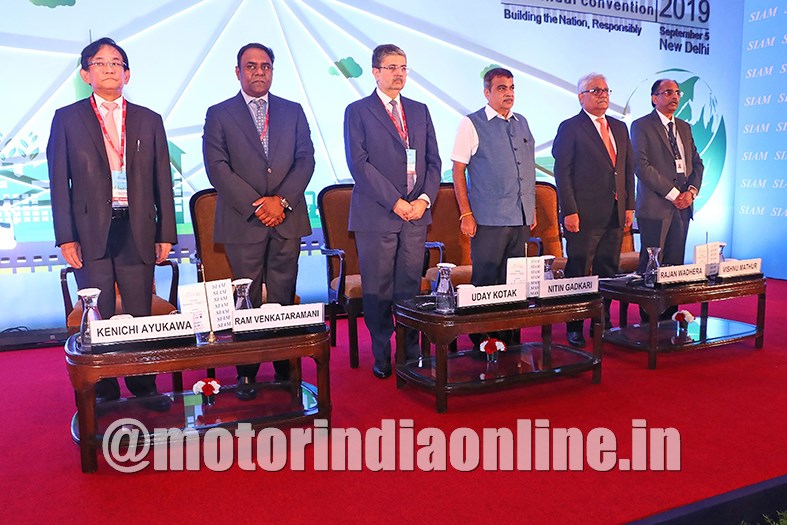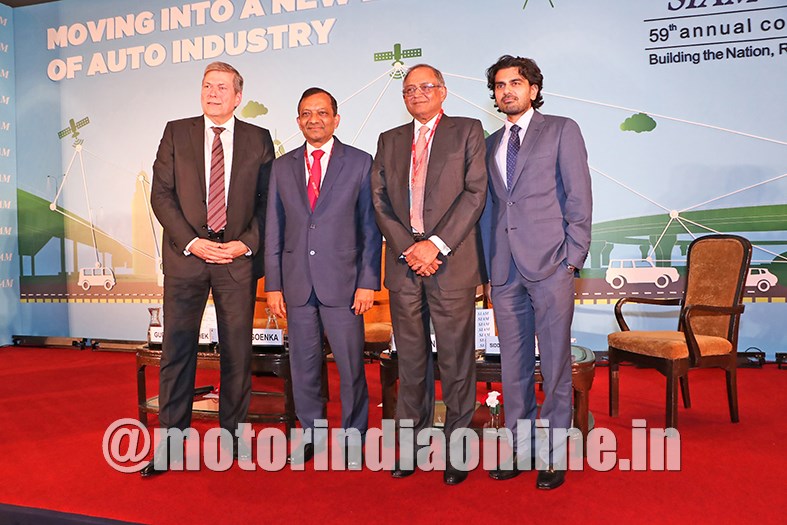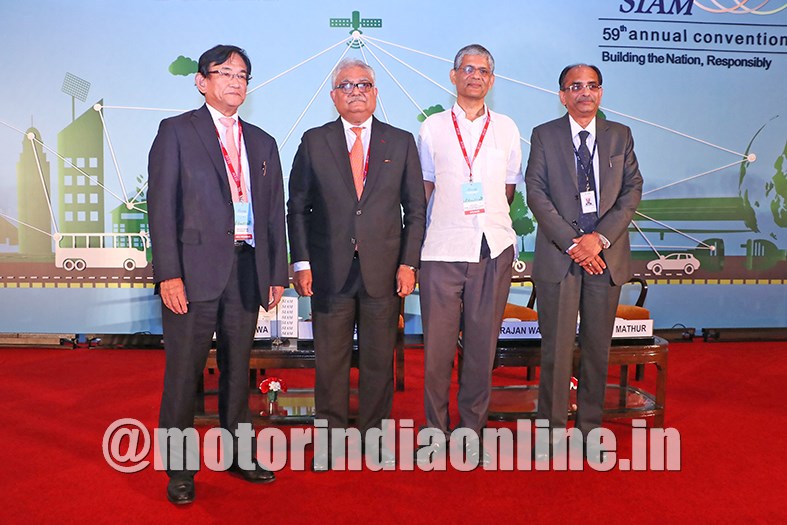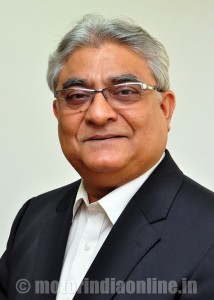The Society of Indian Automobile Manufacturers (SIAM) organised its 59th annual convention early this month at New Delhi where stakeholders from the industry discussed the present scenario of a serious slowdown and also focused on how technology and new emission regulations will impact automotive demand and sales. A report by Dhiyanesh Ravichandran

The annual conference hosted by Society of Indian Automobile Manufacturers, the apex body representing the Indian automotive industry, discoursed on the nature of the prevailing market slowdown and various ways and means to bring things back to order, while also stressing on preparedness for the future beyond the current slowdown against the backdrop of technological disruptions, mobility innovations and automation. With its theme titled ‘Building the Nation, Responsibly: Moving into a New Era of Auto Industry’, the convention focused on how the industry is passing through a critical phase of falling domestic sales and a plethora of technological disruptions with the stakeholders and industry professionals using this as a vibrant and much-needed platform to discuss the crises and opportunities beyond.
Setting out the tone for crucial dialogues, Rajan Wadhera, President, SIAM, reiterated the fact that the industry is at the crossroads. “The automotive industry is integral to economic and social development of the nation, contributing almost 50% of manufacturing GDP, 15% of GST revenue, and a source of employment for over 37 million people directly and indirectly. Yet, it is passing through difficult times with drop in domestic demand and poor sentiments. Till now, 15,000 contractual manufacturing jobs have been lost and another million are at risk if the slowdown is not reversed,” he pointed out.
Nitin Gadkari, Union Minister of Road Transport and Highways and MSMEs, in his address as the chief guest extended assurance and pledged support from the government to the industry in addressing various demands put forth to find a resolution for the current slowdown. “The industry has requested that there should be reduction in GST of petrol and diesel vehicles considering the forthcoming increase in prices of vehicles and the BS-VI norms deadline. Even if GST is reduced for some time, it will help the sector to increase vehicle sales,” he said. Elaborating about the issues related to automotive financing, he asked the industry to establish their own proprietary financing arm to boost sales.

Adding to the Minister’s comments, Uday Kotak, President – Designate, CII, and Managing Director and CEO, Kotak Mahindra Bank, assured the participants that the banking sector will continue to support financing automobile purchases in the best way possible. On surfacing from the slowdown, he suggested: “Automakers need to emphasise on exports to boost supply. This will help to overcome the stress present in the domestic market. The rupee which is weak at present will also favour this method.” He also added that OEMs have strong balance-sheets and therefore must show leadership and help their suppliers and stakeholders in the supply chain at times of distress.
Testing times and way out
At a special CEOs’ panel discussion on the revival of the automotive industry, Dr. Pawan Goenka, Managing Director, Mahindra and Mahindra, noted that the current slowdown is at the wrong time, especially when the industry is making a struggling transition to BS-VI. “If the current market situation continues and industry is unable to bounce back before BS-VI enforcement, it is going to become even more difficult,” he said.
Addressing inquiries about the potentiality of GST rate cuts in improving the current situation, he said that excise duty cuts during previous instances of market slowdown did help the industry to improve sales figures. “For sure, two-wheelers, three-wheelers and passenger cars segments will make a comeback if there is a GST cut at the right time. We have exhausted all other efforts,” he opined.
Guenter Butschek, Managing Director and CEO, Tata Motors, raised a red flag by saying that the Indian automotive growth story is about to collapse. “Low economic activity leading to subdued demand which has been further triggered by the liquidity crisis and increase of the axle load regulations for commercial vehicles and uncertainty in the minds of consumers have severely hurt the sector,” he said. Asked about the slew of measures taken by the Union Government to help the automotive industry, he replied that he was cautiously optimistic about a recovery backed by those measures.

“In order to get out of the crisis and not miss the festive season, we require clarity from the government, here and now, on GST and scrappage policy,” he added.
Commenting on the current situation, Venu Srinivasan, Chairman, TVS Motor Company, said that a plethora of policy changes including insurance premiums and higher GST of 28% resulted in a steep increase of two-wheeler prices by about 35%. “This has led to poor buying sentiment along with a state of confusion in the minds of buyers owing to discussion on various changing trends and regulations, including electric mobility, and so on,” he said.
Future beyond slowdown
Moving on, the speakers at the convention agreed that the industry should not lose its motivation or get dissuaded by the prevailing challenges, but continue to plan for the future and times ahead. They highlighted how innovation, technological breakthroughs and automation are set to change the future of mobility globally, and their likely impacts on the Indian scenario. They deliberated on viable pathways which will lay the groundwork for future mobility and smart manufacturing in the country. For instance, Vinod Aggarwal, Treasurer, SIAM, and Managing Director and CEO, VE Commercial Vehicles, highlighted that the Automobile Mission Plan aims to propel the industry as the primary engine of growth for the ‘Make in India’ program.
He noted that in the domestic context, ‘CASE’ can have a different connotation which is ‘clean, affordable, safe and efficient’. Gurpratap Boparai, Managing Director, Volkswagen India and Skoda Auto India, opened the floor for discussions around Industry 4.0 by mentioning that this revolution would help usher in smart manufacturing. However, there has to be a roadmap which will allow a smooth transition, he added.
Concluding the day-long convention, Dr. A.R. Sihag, Secretary, Department of Heavy Industry, Ministry of Heavy Industries and Public Enterprises, Government of India, commented: “New automotive policies are engineered keeping in mind demands of various stakeholders. Extensive discussion on the economic slowdown is impacting consumer sentiments.”
“Even the talk around GST rate reduction will make the customers wait indefinitely which would impact sales. As far as the scrappage policy is concerned, it is under review and the government is laying down the way forward,” he added.
Summarising the key highlights of what the speakers presented at the convention, Wadhera said: “Automation and innovative solutions will result in smart manufacturing. We should also be mindful that the 4th revolution of the industry shouldn’t reduce jobs. The industry needs to recover fast and before BS-VI kicks in, which will have its own challenges in terms of demand and sales. Further, we will continue the dialogue with the government on GST reduction.”
Top five demands
According to Rajan Wadhera, President, SIAM, the convention has brought forth five priority demands from the automotive industry, as under:
- Considering the forthcoming increase in prices of vehicles post BS-VI, the industry wants a reduction in GST so that consumers are less affected and domestic sales gets a boost.
- The need for nation-wide availability of BS-VI grade fuel from February 1, 2019 onwards as a minimum buffer time of two months is essential for smooth transition from BS-IV to BS-VI.
- A single nodal agency for the automotive sector and its related policies to ensure consolidation and consistency in policymaking and regulations.
- Post BS-VI, the automotive industry wants the government to remove its ‘polluter’ tag and recognise its fullest efforts and commitment towards addressing air pollution.
- The industry seeks favourable policies and macro-economic ambience to enable 14.5% annual growth for the next five years in order to make its distinctive contribution to the aspired economy of $5 trillion.
